|
|
|
Sort Order |
|
|
|
Items / Page
|
|
|
|
|
|
|
| Srl | Item |
| 1 |
ID:
075085
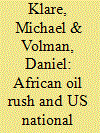

|
|
|
|
|
| Publication |
2006.
|
| Summary/Abstract |
The world's major oil-consuming nations, led by the USA, China and the Western European countries, are keenly interested in the development of African oil reserves, making huge bids for whatever exploration blocks become available and investing large sums in drilling platforms, pipelines, loading facilities and other production infrastructure. Indeed, the pursuit of African oil has taken on the character of a gold rush, with major companies from all over the world competing fiercely with one another for access to promising reserves. This 'oil rush' has enormous implications both for African oil producers and for the major oil-importing countries. For the producing countries it promises both new-found wealth and a potential for severe internal discord over the allocation of oil revenues (or 'rents'); for the consuming countries, it entails growing dependence on imports of a vital substance from a region of chronic instability, with obvious national security overtones. Both these trends are reflected in US policy towards African oil. Desperate to procure additional supplies of foreign oil (to make up for the decline in domestic output), the Bush administration has made strenuous efforts to increase the role of US energy firms in African production. But because instability in Africa is an obstacle to such investment, it has sought to boost the internal security capacity of friendly African states and has laid the groundwork for direct US military involvement in Africa. At the same time Washington has become deeply concerned by China's growing interest in African oil, provoking an intense competitive contest between the two, with growing military overtones. In the end African societies will most probably suffer from this competition as an influx of arms bolsters the capacity of entrenched African regimes.
|
|
|
|
|
|
|
|
|
|
|
|
|
|
|
|
| 2 |
ID:
075082
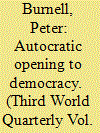

|
|
|
|
|
| Publication |
2006.
|
| Summary/Abstract |
As recent experiments in democratisation around the world show signs of achieving success, or failure, or more usually something in between, the attention of democracy promotion actors in the international community is turning to the world's remaining outstanding autocracies. This article identifies the autocracies, discusses the notion of autocratic opening, and explores how opening can come about, with particular reference to international intervention. The article argues that, for identifying the prospects for autocratic opening and determining the forms of constructive engagement available to international actors, it is useful to distinguish between the different grounds on which various autocracies claim legitimacy, and the specific vulnerabilities to which their principal legitimating base gives rise.
|
|
|
|
|
|
|
|
|
|
|
|
|
|
|
|
| 3 |
ID:
075089


|
|
|
|
|
| Publication |
2006.
|
| Summary/Abstract |
This paper discusses the background to the Palestinian elections and highlights the fact that they are the first democratic elections since 1996. It discusses the reasons for Hamas's participation and the problems it faced. It also examines what issues the electoral candidates needed to touch on in order to win the election. The paper highlights the fact that Fatah's days are over because of widespread corruption. It touches on how Hamas now needs to deal with the international community and how it can compromise with Israel. The paper emphasises that Hamas is the people's choice and that, because it has many obstacles ahead of it, the international community needs to allow it time and to monitor its progress, watching how it deals with being in the real political realm.
|
|
|
|
|
|
|
|
|
|
|
|
|
|
|
|
| 4 |
ID:
075087


|
|
|
|
|
| Publication |
2006.
|
| Summary/Abstract |
Judged by the media reports and statements by US officials in recent months, the USA is seriously considering, or at least thinking about, taking military action against Iran, if it refuses to forgo its legal right to enrich uranium for its nuclear energy programme, which Washington claims is a cover for making nuclear weapons. Iran denies the allegation. The effects of such an attack on Iranian society and the political ramifications beyond Iran's borders are discussed and analysed here. The irony of the present dispute between the West and Iran is that, for three decades up to the Iranian revolution in 1979, the Europeans and Americans helped, in fact earnestly encouraged, Iran in the development of its nuclear programme. The article explains the reasons for the failure of talks between Iran and the European trio to resolve the issue. It argues that, even if the question of Iran's nuclear programme were resolved, the 27-year conflict between the two countries would be unlikely to end in the near future. For Washington the name of the game is 'regime change' in Iran, either through military means or through fomenting internal chaos, hoping for implosion. But considering the political and military difficulties that Washington is experiencing in Afghanistan and Iraq, achieving either of these options is highly problematic.
|
|
|
|
|
|
|
|
|
|
|
|
|
|
|
|
| 5 |
ID:
075088


|
|
|
|
|
| Publication |
2006.
|
| Summary/Abstract |
This article explores the pluralistic momentum in Iran. It challenges the state-centric approach to Iranian politics, arguing that contemporary Iranian reformism manifests itself as a trajectory, yet original and indigenous, political culture that feeds into the political process in a bottom-up manner-from society to the state-not the other way around. Assessing the theoretical, methodological and empirical implications of this hypothesis, the article outlines the contours of Iran's reform movement and its interaction with the country's diverse civil society. As long as Iranian politics is driven by the pluralistic momentum, it is claimed, Iranian reformism will elicit political results and-to highly dissimilar degrees-will continue to provoke the silent subservience of central institutions of the state.
|
|
|
|
|
|
|
|
|
|
|
|
|
|
|
|
| 6 |
ID:
075090


|
|
|
| 7 |
ID:
075084
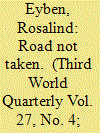

|
|
|
|
|
| Publication |
2006.
|
| Summary/Abstract |
A decade after the United Nations conferences on gender equality and social development, this paper explores their policy origins and discusses their differential impact on international aid since 1995. The author draws on her direct experience to consider why Copenhagen led to Poverty Reduction Strategies and the first Millennium Development Goal, whereas Beijing has become largely invisible in the mainstream world of aid. She argues that the powerful influence of economic rational choice theory associated with bureaucratic modes of thought has meant that the central debate in development policy has remained that of growth versus equity. Beijing's agenda of societal transformation offered another paradigm of development that has remained marginal. The paper concludes with a proposal. If international aid policy could handle more than one paradigm and thus be more open to different ways of thinking about economy, society and politics, aid agencies would be better able to support transformative processes for social justice.
|
|
|
|
|
|
|
|
|
|
|
|
|
|
|
|
| 8 |
ID:
075086
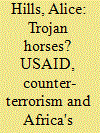

|
|
|
|
|
| Publication |
2006.
|
| Summary/Abstract |
The purpose of US foreign assistance has shifted in the wake of 2001, and Washington has resurrected practices previously associated with police aid during the Cold War. In particular, the Bush administration has broadened the remit of the United States Agency for International Development (usaid) in such a way as to make it a quasi-security agency. The consequences of this could be significant for both usaid and democratic-style police assistance programmes more generally, for today's threat-driven policies are part of a trend which in the past has had worrying consequences. Using the critical variable of public policing (which is illustrated by reference to developments in Kenya), I argue that using usaid to improve the counter-terrorist capacity of Africa's police in the pursuit of US national security objectives is a seriously flawed strategy.
|
|
|
|
|
|
|
|
|
|
|
|
|
|
|
|
| 9 |
ID:
075083
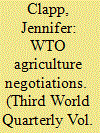

|
|
|
|
|
| Publication |
2006.
|
| Summary/Abstract |
The Doha 'Development' Round of trade negotiations at the wto has featured agricultural trade liberalisation as one of its key aims. But developing countries were frustrated with both the process and the content of the agricultural agreement negotiations early on in the round. This prompted these countries, through a number of developing country groupings such as the G-20 and others, to call for changes in the talks to ensure that developing country voices and concerns were heard. Although developing countries were in many ways successful in registering their concerns in the latter half of the negotiations, and have maintained a fairly high degree of cohesion across the Global South, it remains unclear whether this cohesion will last as the uneven impacts of agricultural trade liberalisation become apparent.
|
|
|
|
|
|
|
|
|
|
|
|
|
|
|
|
|
|
|
|
|